"يا له من رجل ثلجي! خلال الحوار كله، لم يبدّل تعبير وجهه الخاوي، ونظرته القاسية الساخرة.. لم يبدل نبرة صوته الرتيبة الكئيبة والثابتة أشد ما يكون الثبات. في العادة خلال أي حوار، يتغيّر مؤشر جهاز التسجيل صعوداً وهبوطاً تبعاً لنبرة صوت المتحدث، أما في حالته، فالمؤشّر لم يكن يتغير، وفي أكثر من مرة، كنت أعمد إلى السعال لمجرد أن أتأكّد أن المؤشر يعمل".
بهذه الجملة افتتحت الصحفية والكاتبة الإيطالية أوريانا فالاتشي مقدمة حوارها الذي أجرته مع وزير الخارجية الأميركي هنري كيسنجر، إذ استطاعت أن تُحرز هدفا في عالم الصحافة بعد هذا الحوار الذي شكل علامة تاريخية لشخص الصحفية، بينما كان حواراً كارثياً لكيسنجر بسبب ما صرح به خلاله، حيث اعتبر نفسه راعي بقر، مشيراً إلى أن "الأميركيين يحبون راعي البقر الذي يقود عربة القطار بأن يتقدم بمفرده على حصانه.. راعي البقر الذي يخترق الفيافي إلى البلدة أو القرية وليس معه إلا حصانه".
تعتبر فالاتشي شخصية مثيرة للجدل، محاورة من الطراز الأول، أتقنت فن الحوار، وتميّزت بأسئلتها الجريئة، وشُبهت حواراتها بساحة المعركة. غطت أهم الأحداث السياسية التي دارت في القرن العشرين، مثل حرب فيتنام، وحرب الهند وباكستان، والثورة الإيرانية، وغيرها من الأحداث التي جرت في الشرق الأوسط وجنوب أفريقيا. وقد وصلت شعبيتها إلى القمة، وفرضت اسمها في وقت قياسي لدرجة أنه لم يجرؤ أي زعيم أو سياسي أن يرفض طلبها لتجري حواراً معه، وكان أبرزهم أنديرا غاندي، وغولدا مائير، وياسر عرفات، وجورج حبش، ومعمر القذافي، وذو الفقار علي بوتو، وفيلي براندت، وشاه إيران محمد رضا بهلوي، وهنري كيسنجر.
المتابع لحواراتها سيجدها أحياناً منطقية، وأحيانا أخرى قاسية! والمتأمل في صورها التي تحمل السيجارة في معظمها، سيرى شخصا قوياً، واثقاً، لا يخاف! فمن هي هذه الصحفية؟
تربة خصبة
في فلورنسا من العام 1929، ولدت فالاتشي التي عاشت طفولة استثنائية، ورغم الوضع المادي السيئ لعائلتها، فإن والدها إدواردو استطاع أن يخلق بيئة خصبة لابنته بسبب حبه ونهمه للكتب، فكبرت وهي محاطة بها. كما أن والدها كان ناشطاً في صفوف حركة المقاومة الإيطالية ضد الفاشية.
منذ صغرها، تحدّت السلطة وكانت شخصيتها الثورية ظاهرة، إذ تعلمت إطلاق النار وتدربت على الصيد في الرابعة عشرة من عمرها، وعملت كساعي بريد للمقاومة، حيث كانت تهرّب القنابل اليدوية داخل سلتها التي كانت تملؤها بأوراق الخس وتضعها في دراجتها، بالإضافة إلى توصيل رسائل سرية للمقاتلين المناهضين للفاشية.
اختارت دراسة الطب في بداية مشوارها، وعملت كصحفية لدفع تكاليف الدراسة، لكنها سرعان ما تفرّغت للصحافة وتركت الطب، وكان عليها مواجهة الواقع آنذاك، حيث كانت الصحافة حكراً على الرجال.
تبنت حينها حقوق المرأة وفرضت نفسها في عالم "صحافة الرجال"، وذلك بإعداد تقارير قوية لاقت رواجاً في إيطاليا، وكُلفت بإعداد تقارير حول قضايا المرأة في تركيا وباكستان والهند وماليزيا وهونغ كونغ واليابان. وفي أواخر الخمسينيات، انتقلت إلى العمل في مجلة "إل أوروبيو" التي أرسلتها إلى الولايات المتحدة لمدة شهر لتغطية بعض الأحداث المرتبطة بهوليود، وهناك عاشت أفضل فترة في حياتها.
لم ترُق لها مقابلات مشاهير هوليود، ووصفتهم بأنهم "عوالم فارغة، وعالمي ليس هنا"، لتنتقل بعدها لتغطية البرنامج الأميركي الخاص لوكالة "ناسا" على مدى عدة سنوات، وبعد ذلك اتجهت إلى تغطية حرب فيتنام، لتصبح مراسلة الحرب الأشهر في إيطاليا.
حوار مع التاريخ
كانت فالاتشي تستعد لحواراتها بقراءة كل معلومة متاحة عن الشخص الذي تريد مقابلته، وعناصرها ثابتة دائماً: بحث متمعن، وأسئلة جريئة، ومشهد مسرحي.
كان أسلوبها واضحا جدا في كتابها "حوار مع التاريخ" (1976) الذي ضم أهم الحوارات التي أجرتها، وقد أهدته إلى أمها، وجاء في نص الإهداء: "عمليا، هذا كتاب عن السلطة.. كتاب تحرر من السلطة. أمي بكل ما لديها من براءة لا تفهم لماذا يكون لرجل أو امرأة أن يقرر ما ينبغي أو لا ينبغي القيام به.. أتفهمون؟ هذا هو الموقف الأناركي الذي يتبناه الولد في القصة، وهو موقفي". انتشر هذا الكتاب بشكل ملحوظ، وكان علامة فارقة في مسيرتها المهنية، وأصبح الأول في سلسلة كتبها الرائجة في العالم كله.
كانت شديدة المباشرة وجريئة في الطرح، كالرصاص، تمتد حواراتها لما بين أربع وست ساعات: "في هذه الساعات أحرقُ الكثير من الطاقة لدرجة أنني أفقد من وزني أكثر مما يفقد ملاكم في حلبة". وكلما سنحت الفرصة، تحب أن تقابل ضيوفها لمرة ثانية لتتأكد من انطباعاتها الأولى. كما أنها تعمل بلا كلل على منطق الحوار، فتفرّغ كل حرف، وتتحقق من ترجمتها مستعينة بالقاموس، ثم تكتب النص كمن يكتب مسرحية، فتقصّ وتلصق، وتحقق الإيقاع والتدفق.
من أهم هذه الحوارات التي شهدت على ذلك، حوارها مع آية الله الخميني في إيران، حيث انتقدت لباس المرأة الإسلامي، وكانت غير دبلوماسية لدرجة أن ضيفها غادر أثناء إجراء المقابلة، أو عندما سألت معمر القذافي في ليبيا "هل تعرف أنك غير محبوب وغير مرغوب فيك؟"، وكذلك كيسنجر الذي سألته "إلى أي درجة تذهلك السلطة؟" في المقابلة التي ساهمت في زواله السياسي.
كل حوار يمثل وجهة نظر، مع أو ضد.. وفي بعض الأحيان قد تخطئ أو تنحرف عن المسار، وستعترف لاحقا أن ذلك حدث وهي تحاور الزعيم الفلسطيني جورج حبش مؤسس الجبهة الشعبية لتحرير فلسطين، الذي وصفته بأنه من أنصار الإرهاب الدولي، لكنها كانت معجبة به.. إعجاب يتعارض مع حكمها العقلي عليه، يظل يتنقل بها بين حكاياته عن العمل مع اللاجئين وإنشائه مستشفى (كونه طبيبا أيضاً)، حتى تدرك خطأ حكمها بعد مرور وقت طويل فتعترف بذلك علنا.
كانت القضية الفلسطينية حاضرة في تاريخ أوريانا الصحفي حيث دعمتها لعقود، ثم بدأت مواقفها تتغير تجاه الفلسطينيين حيث قالت ذات مرة "أعترف بأنني في الماضي قاتلت كثيرا وبقوة ضد الإسرائيليين، ودافعت عن الفلسطينيين كثيراً، ربما أكثر مما يستحقون".
"أسئلتي قاسية لأن البحث عن الحقيقة أشبه بالجراحة، والجراحة تؤلم".. هكذا قالت ذات مرة وفقاً لما ورد في كتاب "أوريانا فالاتشي.. الصحفية، المحرّضة، الأسطورة" للكاتبة كريستينا ديي ستيفانو التي وثقت السيرة الذاتية للصحفية، وينقل الكتاب عنها قولها إن "معظم زملائي لا يملكون الشجاعة لطرح الأسئلة"، فإلام أدت شجاعة هذه الصحفية في النهاية؟
نهاية فالاتشي
"أنا الشخص الذي يفسر المعلومات، وأكتب دائما بضمير المتكلم.. ومن أنا؟ أنا إنسان".
تغيرت "الأنا الانسانية" لدى فالاتشي مع تقدمها بالعمر، وفقدت قيمتها الصحفية عندما تبنّت اللغة التحريضية كأسلوب جديد، ضاربة بعرض الحائط القيم الإنسانية وأخلاقيات العمل الصحفي.. كان ذلك واضحاً من خلال آرائها ومؤلفاتها ومقالاتها التي أثارت جدلاً واسعاً بسبب انتقاداتها اللاذعة ومواقفها المعادية للإسلام، بلغت حد اتهامها "بالعنصرية الدينية" من جهة، ودعم المحافظين الإيطاليين لها من جهة أخرى. أحد هذه المنشورات كان كتاب "الغضب والغرور" (2002) الذي نُشر في إيطاليا بعد أشهر قليلة من هجمات 11 سبتمبر/أيلول 2001، وبيعت منه مليون نسخة في إيطاليا وحدها. وتضمن الكتاب تعبيرات عنصرية ضد المسلمين من قبيل أنهم "يتكاثرون كالأرانب".
وبعد تفجيرات القطارات في مدريد في مارس/آذار 2004، نشرت فالاتشي مقالاً بعنوان "عدو من الداخل" ما لبثت أن طورته إلى كتاب بعنوان "قوة العقل" التي نشرته في الولايات المتحدة قبل وفاتها ببضعة أشهر، وقد حذرت فيه من مخاطر "استعمار إسلامي لأوروبا"، وذكرت أن الإسلام "يزرع الكراهية بدلا من الحب، والعبودية بدلا من الحرية". وهذه الكلمات عكست لهجة كتابتها في سنواتها الأخيرة، حيث تلقت النقد بسبب "إدانتها الشاملة لجميع المسلمين".
وبهذا ختمت فالاتشي حياتها بين الكتابة عن أحقادها على المسلمين وعلاجها الكيميائي الذي لم يمنعها من استكمال عملها، متنقلة بين نيويورك وفلورنسا، حتى رحلت عام 2006 في مسقط رأسها فلورنسا عن عمر يناهز 77 عاماً، بعد صراع طويل مع مرض السرطان.
اعتبرها البعض "مثالا للشجاعة" والبعض الآخر "حاقدة".. حياتها المثيرة للجدل جعلتها محط أنظار الكتاب ومخرجي الأفلام، وألهمتهم توثيق تجربتها المليئة بالتناقضات، على الرغم من أنها لم ترغب أن توثق حياتها بفيلم أو كتاب، بيد أن كريستينا دي ستيفانو أصدرت كتابها "أوريانا فالاتشي.. الصحفية، المحرّضة، الأسطورة" عام 2013، وقام المخرج ماركو توركو بإخراج فيلم "حياة الصحفية والكاتبة الإيطالية أوريانا فالاتشي" عام 2015.
الكتاب والفيلم قدما صورة المرأة القوية والأسطورة والجريئة التي لا تخاف، وبشكل ناعم تطرقا إلى هفواتها التي ارتكبتها خلال مسيرتها المهنية. إلا أن الكاتب سانتو أريكو قدم لنا الوجه الآخر لفالاتشي في كتاب "كشف القناع عن أوريانا فالاتشي"، حيث تطرق إلى محطات فالاتشي المهنية، والأكاذيب التي لفقتها لتبني صورتها المثالية كصحفية، مدعما حججه بالوثائق والأرقام.
مراجع:
1- https://lithub.com/the-interview-that-became-henry-kissingers-most-disastrous-decision/
http://readingtuesday.blogspot.com/2017/10/blog-post_28.html
2- Cristina De Stefano, Oriana Fallaci: The Journalist, the Agitator, the Legend (Italy 2013)
3- https://kitabat.com/cultural/أوريانا-فالاتشي-صحافية-وكاتبة-ملهمة/
4- https://lithub.com/the-interview-that-became-henry-kissingers-most-disastrous-decision/
5- http://readingtuesday.blogspot.com/2017/10/blog-post_28.html
6- https://lithub.com/the-interview-that-became-henry-kissingers-most-disastrous-decision/
-The life of Italian journalist and writer Oriana Fallaci.
https://www.imdb.com/title/tt3558992/
-Oriana Fallaci: The Journalist, the Agitator, the Legend
https://www.goodreads.com/book/show/34063511-oriana-fallaci
-The Unmasking of Oriana Fallaci: Part II and Conclusion to Her Life Story








































